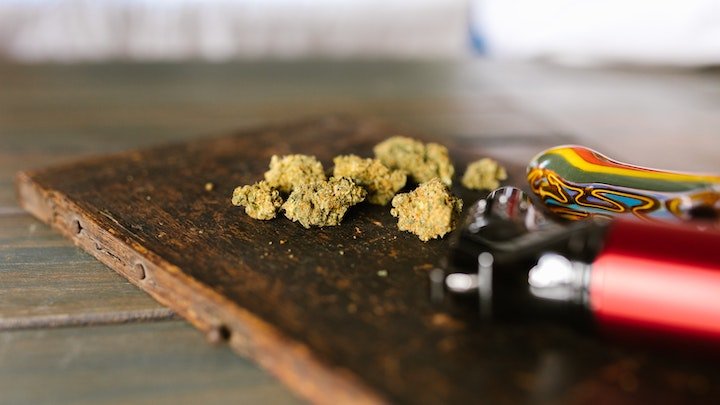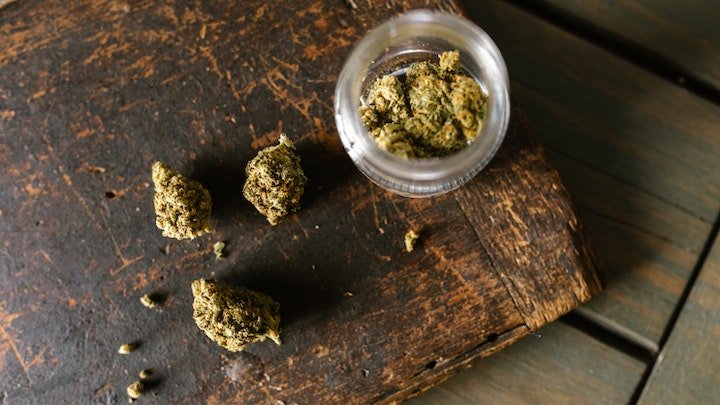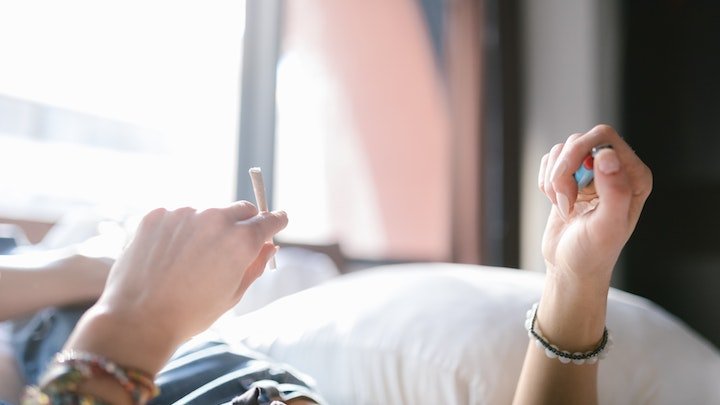Cannabis is a plant, famous all over the world for being a recreational drug. Its long, green leaves are forged into buds, joints, and oils, and are known for the pleasurable effects they produce when ingested.
The means of consuming Cannabis vary depending on the form in which individuals acquire it.
It can be smoked, brewed into a hot drink, or cooked into food. Regardless of the method used, those who take it experience a ‘high’ associated with various sensations.
These can be both pleasurable and adverse effects, and they usually include:
- Happiness, confidence, and excitement
- Relaxation
- Lack of inhibition
- Skewed perception of time and space
- Sensory hallucinations
- Problems with memory
- Psychotic symptoms, such as paranoia
- Inability to make sound judgements or solve problems
Cannabis is able to produce its pleasurable effects because of an active ingredient known as Tetrahydrocannabinol (THC). When ingested, THC enters the bloodstream and makes its way to the brain – a process which takes longer when Cannabis is eaten than smoked [1].
In the brain, THC activates millions of cannabinoid receptors. This sparks a range of sensations in the brain, including a spike in dopamine levels which produces a ‘high’ and its associated pleasures, such as happiness and pain relief.
Is it possible to overdose on Cannabis?

A common concern among substance users is whether their habit brings with it the risk of overdose. The same applies for those who use Cannabis, but is an overdose possible?
The subject of Cannabis overdose is a debated topic. While there is no evidence to suggest you can suffer a fatal overdose from Cannabis in the same way you might with certain opioids, there is a point at which the body begins responding negatively to it.
Overdosing on Cannabis is more akin to a bad reaction, but that does not mean that there are no serious consequences to it happening. In regard to how much is too much, everyone will have a different tolerance to Cannabis, with numerous factors playing their part.
For example, an individual’s personal tolerance – and therefore the amount of Cannabis they can ingest without overdosing – depends on their age, sex, Body-Mass Index (BMI), metabolism, consumption habits, and exercise routine.
What happens when you overdose on Cannabis?

In the sense that Cannabis overdose is not like that of other drugs, the threat of dying is not present. However, there are negative consequences that can arise and must be identified to reduce risk.
These include:
- Unresponsiveness and potential unconsciousness
- Slow reflexes and reaction times
- Drowsiness and fatigue
- Nausea and vomiting
- Rapid heart rate and chest pain
- Headaches
- Dry mouth
- Confusion, dizziness, and disorientation
- Anxiety
- Sensory hallucinations
- Panic attacks
Individuals can experience such effects for up to a full day. In most cases, the duration of an individual’s overdose will coincide with the THC concentration of the Cannabis consumed. That’s why individuals must take care when consuming Cannabis regularly or in high doses.
Children and Cannabis: the increased risks of overdose on cannabis

It is rare that children will consume Cannabis, but there are situations where it can happen. For example, in the instance of the drug being baked into edible Cannabis products, the chances of children accidentally consuming it increases.
Due to their age, body size, and brain development, children have a much lower tolerance for Cannabis and THC than adults. As a result, it takes much lower doses for them to overdose on the drug, and they can also experience intensified effects.
Children will be much more vulnerable to effects such as anxiety, nausea, and dizziness. If a child is suspected to have overdosed on Cannabis, the emergency services must be contacted immediately to ensure they become sober again as safely as possible.
How to spot Cannabis overdose – signs of cannabis overdose

There is a fine line between being ‘high’ on Cannabis and experiencing an overdose. As outlined above, the nature of a Cannabis overdose is unlike that of other drugs, so spotting a bad reaction to it can be a difficult task.
However, there are a few signs that you can look out for in order to ascertain whether someone you know is experiencing an overdose.
Signs of cannabis overdose: Complaining of thirst
Taking too much Cannabis causes dry mouth, but if you are not the person experiencing it, the way to identify it is if an individual keeps complaining that they are thirsty. They might also drink a lot and continue complaining of thirst.
Signs of cannabis overdose: Talking nonsense
It is normal for an individual who is ‘high’ to talk a lot without making sense. Strong overdose, however, is characterised by hallucinations, so listen out for comments about things that aren’t actually there. These can be both visual and auditory hallucinations.
Signs of cannabis overdose: Check their pulse
If your friend seems to be acting strangely while ‘high’, you can conduct a quick test by checking their pulse. By putting your fingers either to their wrist or on their neck, you can check if their heartrate is fast. This is one of the key signs of overdose.
Cannabis overdose: what you need to do when it happens

Because Cannabis overdose in adults is not as serious or life-threatening as that caused by opioids, it is not always necessary to contact emergency services. If you are unsure or frightened, an ambulance is always an option, but there are alternative ways for coping.
Ingest something
The first thing you can try and do is to eat and drink. Drinking will directly help combat your experience of dry mouth, especially if you have been vomiting and are becoming further dehydrated. Eating, too, can help sober you up.
Try to sleep
In some circumstances, waiting out the effects of overdose is the best way forward. This strategy can be made easier by trying to sleep, though you must first make sure that you are suitably hydrated and are not at risk of choking on your own vomit.
Settle yourself down
Stimulation can exacerbate feelings of anxiety and sensory hallucinations. Sights, sounds, smells – if there’s a lot going on around you, trying to calm down can be difficult. As a result, you might want to try leaving a busy location, turning off the TV, or going somewhere quiet.
Try black peppercorns
Studies have found that black peppercorns contain something known as caryophyllene, a substance which negates some of the stressful effects of THC [2]. In the event of an overdose, you may want to consider getting some to chew on or smell.
Reach out to a friend
If you are using Cannabis alone, a great way to manage an overdose is to reach out for help. If a friend or family member can sit with you, it can help calm you down and help you rationalise what is going on. This also protects you from accidentally harming yourself.
How long does Cannabis take to pass through the body?

Part of minimising the risk of Cannabis overdose is ensuring that the levels of THC in the brain do not become too high. Staying in control of this, however, requires a certain understanding of Cannabis’s relationship with the body and how long it remains present.
After a single use, Cannabis tends to take around 3 days to completely leave the body. A number of factors will affect this, however, including an individual’s metabolism, body mass, and sex.
Using Cannabis regularly also has an effect. If an individual uses Cannabis several times a week, the time it takes to become sober increases from 3 days to a week. And if they use it every day, this lengthens again to 15 days.
It is clear that reducing the risk of overdose requires an awareness of how frequently Cannabis is being used and how much THC is being allowed to build up in the brain.
Reducing the risk of cannabis overdose

In addition to watching your Cannabis consumption, there are several techniques you can employ to help reduce the risk of overdose.
These include:
- Start small – When consuming Cannabis, begin with a small dosage. Starting with a high dosage poses the risk of shocking your system, so allow your body to cope by gradually increasing your consumption if that is what you want to do.
- Consider your ingestion method – Different ways of consuming Cannabis result in different activation times. Eating it, for example, takes longer, so do not become inpatient and consume more in an attempt to hasten the effects.
- Stay comfortable – Consuming Cannabis can increase anxiety levels. As a result, reduce your desire to consume more by staying in an environment where you feel safe and comfortable.
The problems that rise from Cannabis abuse

Overdose is a risk that comes with regular Cannabis use. Abuse of the substance can give rise to additional problems, and it is important that the risk of overdose does not draw attention away from other negative health effects.
Neurological problems
Cannabis has a direct relationship with the brain, and using it on a regular, long-term basis can result in physical changes in the organ’s structure. Studies have found a link between Cannabis use and shrinkages in areas of the brain associated with memory and learning [3].
This risk is known to be higher for those who start using Cannabis at a younger age and whose brains are still developing.
Respiratory complications
Smoking Cannabis regularly can cause damage in a lot of key areas related to breathing. The throat and lungs are particularly vulnerable, and a range of health complications can develop as a result.
Individuals can, for example, be at greater risk of developing chronic bronchitis, lung or throat cancer, and a persistent cough.
Worsening mental health
Mental health and Cannabis use occupy a complex relationship with one another. Individuals can use the drug to improve their mood and mental state, but such reliance can also result in things getting worse.
Research has suggested that there is a link between Cannabis abuse and disorders such as anxiety and depression. Some studies even go as far as to outline the increased risk Cannabis users have of developing psychosis [4].
Cannabis use disorder
Using Cannabis as a means of boosting mental health and ensuring productivity creates the potential for abuse. If it becomes a part of an individual’s routine, their brain can forge a relationship between Cannabis and regular functioning.
Over time, such an association can become so strong that an individual feels like they cannot live without it. Anxiety, panic, and depression can arise when the drug is absent, creating problems in their personal and professional lives.
Where OK Rehab can step in
Cannabis is an incredibly famous substance, and this means that understanding its effects is incredibly important. The risks of taking the drug can be a great source of fear and concern, but OK Rehab are here to help.
If you want more information on Cannabis and its effects, or want to discuss your consumption to determine whether you are at risk of overdose or addiction, our team are available to assist you with cannabis addiction treatment in the form of cannabis rehab.
Give us a call at 0800 326 5559, and let us support and guide you!
References
[1] https://nida.nih.gov/publications/drugfacts/cannabis-marijuana





